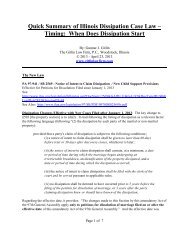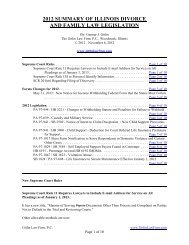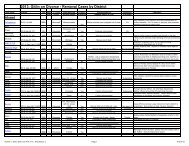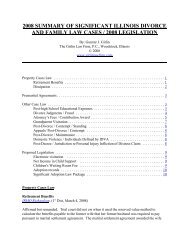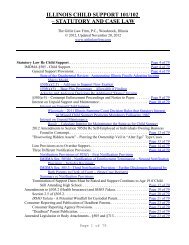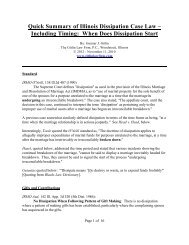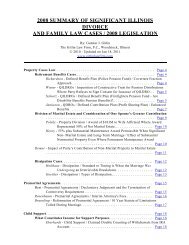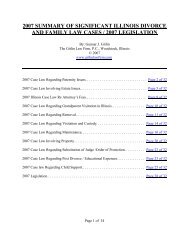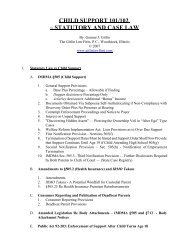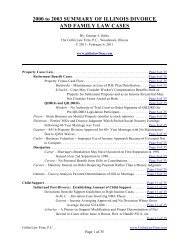Illinois Attorney's Fees and the Leveling the Playing Field Act
Illinois Attorney's Fees and the Leveling the Playing Field Act
Illinois Attorney's Fees and the Leveling the Playing Field Act
Create successful ePaper yourself
Turn your PDF publications into a flip-book with our unique Google optimized e-Paper software.
elow, we can simply go to court <strong>and</strong> have a full, blown out litigation slash war.” In previous<br />
years <strong>the</strong> husb<strong>and</strong>’s gross income had been over $1M but in 2004 it was approximately<br />
$400,000. The husb<strong>and</strong> had an interest in three businesses <strong>and</strong> received a yearly salary. The<br />
trial court ultimately “ordered Bruce to contribute $700,000 to Lisa’s attorney fees because<br />
“Bruce holds a financial position far superior to [Lisa’s] <strong>and</strong> is well able to help defray her fees,<br />
<strong>and</strong> because <strong>the</strong> Court believes that Bruce protracted <strong>the</strong> litigation out of sheer vindictiveness.”<br />
There were appeals <strong>and</strong> cross-appeals <strong>and</strong> <strong>the</strong> appellate court generally affirmed <strong>the</strong> trial court’s<br />
decision.<br />
The critical discussion on appeal addressed <strong>the</strong> bundled services of SDF <strong>and</strong> stated:<br />
Though not explicitly required by section 503(j), we have found that contribution<br />
awards under that section must be reasonable. Hasabnis, 322 Ill. App. 3d at 596<br />
(“Section 503(j) does not expressly require <strong>the</strong> award of fees be reasonable, but<br />
since we cannot envision a grant of legislative authority that tells judges to be<br />
unreasonable, we read <strong>the</strong> statute as incorporating a reasonability requirement”).<br />
Bruce, relying primarily on our holding in Hasabnis, argues on appeal that “<strong>the</strong><br />
trial court’s finding–that it is impossible to tell with precision whe<strong>the</strong>r all <strong>the</strong><br />
work performed was reasonable–should have resulted in a denial of all of <strong>the</strong> fees<br />
requested in [Lisa’s] contribution petition,” because such a finding is necessary to<br />
award contribution under section 503(j) of <strong>the</strong> <strong>Act</strong>. We disagree.<br />
The appellate court stated that based upon Hasabnis did not require <strong>the</strong> necessity of fees but did<br />
require <strong>the</strong> fees to be reasonable. The court cited this case for <strong>the</strong> proposition that, While a trial<br />
court may review <strong>the</strong> petitioning party’s billing records, it is not required to do so” although it<br />
recognized that DeLarco, 313 Ill. App. 3d 107 (2000), had held that <strong>the</strong> trial court “ ‘must,’ in<br />
making an award of fees pursuant to a contribution petition, ‘consider whe<strong>the</strong>r <strong>the</strong> attorney fees<br />
charged by <strong>the</strong> petitioning party’s attorney are reasonable.’<br />
Fee Equalization <strong>and</strong> “Unless O<strong>the</strong>rwise Ordered” of <strong>the</strong> Interim Fee Statute: The holding<br />
in DeLarco regarding “fee equalization” not being a part of <strong>the</strong> contribution statute is significant<br />
in light of <strong>the</strong> potentially confusing language of <strong>the</strong> statute. The interim fee portion of <strong>the</strong> statute<br />
states that “unless o<strong>the</strong>rwise ordered” all fees paid shall be deemed an advance against <strong>the</strong><br />
marital estate. The query was what <strong>the</strong> phrase “unless o<strong>the</strong>rwise ordered” refers to. In one case<br />
that I tried, <strong>the</strong> trial judge treated all fees paid by each party as an advance against <strong>the</strong> marital<br />
estate — despite <strong>the</strong> fact that <strong>the</strong> lion's share of <strong>the</strong>se fees were paid in fighting for custody on<br />
<strong>the</strong> fa<strong>the</strong>r's behalf due to <strong>the</strong> mo<strong>the</strong>r's active alcoholism. Her alcoholism created multiple delays<br />
of <strong>the</strong> trial. Unfortunately, <strong>the</strong> case I had was tried shortly prior to <strong>the</strong> DeLarco decision <strong>and</strong> far<br />
prior to <strong>the</strong> IRMO Holthaus, 899 N.E.2d 355 (Second Dist., 2008). I had hoped that <strong>the</strong> client<br />
would have authorized an appeal of this matter but he did not do so. I previously wrote, “ I<br />
believe <strong>the</strong> court has full discretion to choose to treat attorney's fees paid by each party through<br />
<strong>the</strong> marital estate as tantamount to “dissipation” or to choose not to do so.”<br />
Holthaus has addressed most directly <strong>the</strong> “unless o<strong>the</strong>rwise ordered” language of Section 501(c-<br />
1)(2) of IMDMA. Despite <strong>the</strong> potential waiver issue in terms of <strong>the</strong> issue not being argued at <strong>the</strong><br />
Gunnar J. Gitlin Gitlin Law Firm, P.C. www.gitlinlawfirm.com




